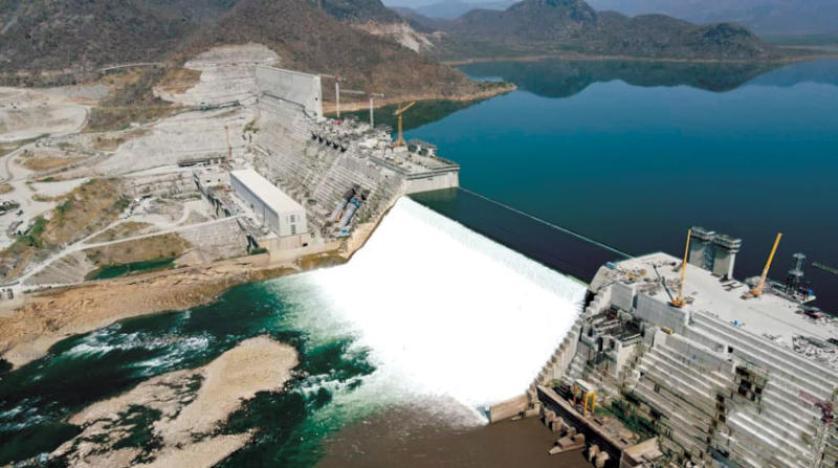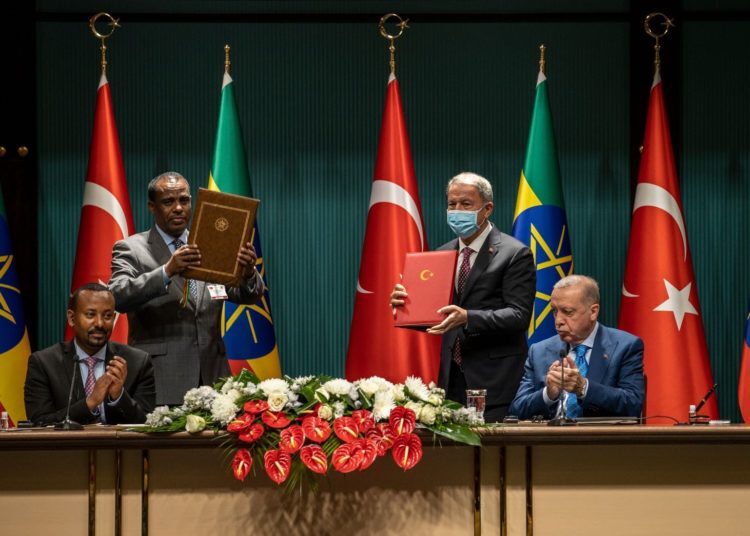Levent Kenez/Stockholm
The Turkish parliament approved a military agreement signed with Ethiopia in 2021 just hours before parliament went on recess due to the May 14 elections. The agreement entered into force after President Recep Tayyip Erdogan signed the legislation and published it in the Official Gazette on April 10. While many international agreements will wait to be ratified in the new legislative term, it is noteworthy that the government passed the agreement through parliamentary approval at the last minute.
Opposition lawmakers in parliament’s Foreign Affairs Committee previously saw the step for ratification of the agreement as an inconsistency in the government’s foreign policy at a time when Ethiopia and Egypt are involved in a dispute over the construction of a dam on the Nile, considering that Turkey has been trying to repair relations with Egypt.
İYİ (Good) Party deputy and retired diplomat Ahmet Kamil Erozan claimed that Turkey had serious problems with Egypt at the time the agreement was signed and that now is not the right time to ratify it. Stating that there is no coordination between the Ministry of Foreign Affairs and the Ministry of Defense, Erozan said ratification of the agreement would annoy Egyptian President Abdel Fattah el-Sisi.
Egypt and Sudan are in a dispute with Ethiopia over the nearly finished Grand Ethiopian Renaissance Dam being built on the Nile River. Egypt is worried about a decrease in water in the Nile River, from which it meets almost all of its drinking water and irrigation needs. Although the three countries intend to come together and negotiate a solution to the problem, they have not been able to establish a mechanism to produce a concrete solution so far.
In July 2021 Ethiopia completed the second stage of filling the reservoir, and in August 2022 the third stage, while Addis Ababa is expected to finish the fourth stage of filling by summer.
Last month Egyptian Foreign Minister Sameh Shoukry warned Ethiopia, stating that all options were on the table if the objections of Sudan and Egypt were not taken into account, threatening the possibility of a military intervention.
As a response, Ethiopia invited Egypt to respect international law and declared that solutions could be found at the African Union within the framework of goodwill.
During an official visit of Ethiopian Prime Minister Abiy Ahmed to Ankara on August 18, 2021, three separate agreements were signed by the defense ministries — the Financial Contribution Implementation Protocol, the Military Financial Cooperation Agreement and the Military Framework Agreement — the last of which was the first to be submitted to parliament.

The areas of cooperation in the agreement are listed as joint participation in military exercises and non-combat operations such as peacekeeping, humanitarian aid and counter-piracy operations. The agreement also allows the two countries to cooperate in the defense industry.
According to Article IV(6) of the agreement, the parties also agree to share military intelligence. Moreover, the parties will provide mutual logistical support and exchange munitions, materials and services in the form of grants or in return for payment.
An article on the protection of classified information and physical and intellectual property rights generally included in agreements on cooperation in the defense industry that Turkey has signed with countries to which it plans to sell weapons is also included in the framework agreement with Ethiopia.
The Ethiopian side had previously completed the ratification of the agreement
For some time now the government of President Erdogan has been trying to repair uneasy relations with Egypt. Turkey experienced serious problems with Sisi’s Egypt over the support it gave to the Islamist Muslim Brotherhood, which Erdogan sees as ideologically close to him. Turkey and Egypt also support two rival groups in Libya, both of which claim to represent the only legitimate government.
However, when Erdogan’s policies resulted in Turkey’s isolation in the Islamic world, Turkey started negotiations to woo Egypt and Saudi Arabia, which demanded that Turkey take concrete steps to address their concerns. Turkey first asked TV stations affiliated with the Muslim Brotherhood that broadcast from Istanbul to dial down their rhetoric.
Turkish Foreign Minister Mevlüt Çavuşoglu visited his Egyptian counterpart, Sameh Shoukry, in Cairo on March 18, a new step in the normalization of relations. After the meeting the two sides declared that the consultations would continue, while Turkey reiterated its offer of Egyptian participation in joint military exercises with Turkey. Ankara has long been expressing dissatisfaction with Egypt’s joint exercises with Greece and Cyprus in the Mediterranean and Aegean seas. However, Çavuşoglu said, “We can’t demand that Egypt cut its ties with Greece just because they have improved relations with us.”
At a press conference following the meeting, Çavuşoglu said the Defense Ministry and General Staff has invited Egypt to three military exercises so far, adding that the countries need to intensify joint work in the military sector. Nordic Monitor learned that Turkey invited the Egyptian armed forces to naval and air exercises in 2021; however, no response was ever received.
Çavuşoğlu also stated that relations with Egypt and its neighbours were discussed during the visit. It is known that Ankara intends to be a mediator between Ethiopia and Egypt for a long time. Previously, it was discussed in Ankara that Turkey could use his closeness with Ethiopia as an opportunity to improve relations with Egypt, but no action was taken.
Turkish-Ethiopian military relations came to the international agenda after the Ethiopian army on January 7, 2022, hit a primary school building filled with children, women and elderly men with drones bought from Turkey. At least 59 civilians were killed in the attack, and dozens more were injured. Up until that time, Turkey was not known to have sold drones to Ethiopia. Weapons remnants recovered from the site were determined to be MAM-L (smart micro munition) guided bombs produced by Turkey’s Roketsan and paired exclusively with Turkish-made Bayraktar drones produced by Erdogan’s son-in-law’s company.












